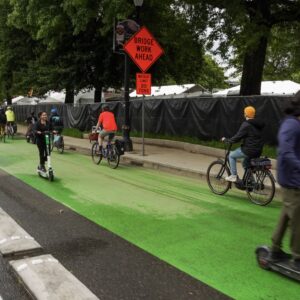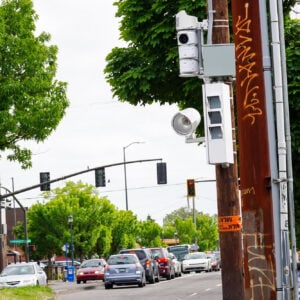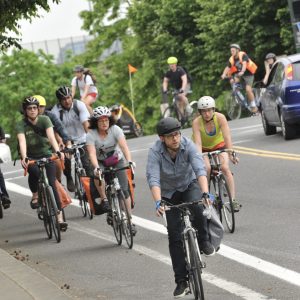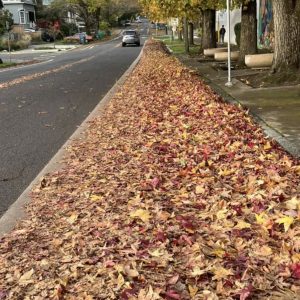“Council finds: Skateboarders use neighborhood streets as a venue for an extreme thrill sport, and not as a means of transportation for which the streets were designed;”
— Text from the skateboarding ban ordinance
The Bicycle Transportation Alliance (BTA) has waded into the debate over whether or not City Council should support a proposed ban on skateboarding in the West Hills.
In a letter to Commissioner Randy Leonard (who’s pushing the ordinance at the behest of Arlington Heights Neighborhood Association board member Eric Nagle), the BTA said that despite a recent clarification in the ordinance that the ban would not include bicycles, they remain uncomfortable with the proposal and they want it removed from tomorrow morning’s City Council agenda.
Specifically, the BTA is concerned about a section in the ordinance’s pre-amble that reads:
“Skateboarders use neighborhood streets as a venue for an extreme thrill sport, and not as a means of transportation for which the streets were designed;”
For very obvious reasons, this language is totally out of line. Our streets were not designed solely for transportation; they are public spaces used for a variety of purposes.
The BTA says the ordinance would, “legislate recreation and physical activity out of the roadway.” “Our city-funded Safe Routes to School programs,” states the BTA letter, “encourages kids to walk, bike, skateboard, scooter, rollerblade, and rollerskate to school. This ordinance runs counter to our shared goals.”
The BTA also adds weight to the concern that this ban proposal — which was pushed through by Nagle and Leonard’s office outside of an existing collaborative process to find solutions to dangerous skateboarding in the West Hills — will do little to actually solve the problem.
Here’s how the BTA puts it:
“For nearly a year, this informal group, including staffers from the Police Bureau, Parks, the Bureau of Transportation, and invested volunteers, has worked on a safety campaign focused on curbing dangerous skateboarding in Arlington Heights. This ordinance has put the launch of that campaign on hold… it would seem wise to pursue behavior change through education and engineering rather than another enforcement-based solution.
In short, this ordinance has a negative effect on responsible road users, particularly neighborhood kids, while undermining a safety campaign that the city, including the Police, considers to be the best solution to a very serious issue.”
The BTA says they’d rather not have to oppose the ordinance when it comes up at City Council tomorrow morning. Instead, they want Leonard to withdraw it from the agenda.
The BTA’s involvement raises the stakes on this issue for Mayor Sam Adams and the other commissioners who could be forced into a vote on it tomorrow. Now the Portland Police Bureau and the city’s largest bicycle advocacy group have publicly opposed the ordinance. First seen as just a skateboarding issue, it has become clear in the past week or so that much more is at stake and this ill-conceived ordinance should not move forward.
In addition poorly crafted and dangerous language, the proposal would quadruple fines (from $25 to $115) for a variety of traffic infractions targeted at people riding skateboard, scooters, roller skates, and “similar human powered devices.”
Mayor Adams, who leads both the police and transportation bureaus, should be at the center of this debate; but so far he has not commented. Asked yesterday for his position, Adams’ transportation policy director Catherine Ciarlo said Adams will, “Hear what’s presented at Council and make a decision at that time.”
I’ve asked Commissioner Leonard and his policy advisor Stu Oishi for a response and will update this story when/if I hear back.
I’ll be reporting from City Council tomorrow morning. Stay tuned.
— Full coverage of this issue in the archives.
UPDATE, 1:32pm: I just spoke with Commissioner Leonard. He said he’s willing to take the ordinance off the table if the community (including skateboard advocates, bicycling advocates and so on) would re-affirm their commitment to a solution and set a clear timeline for moving forward with it.
“If there is an agreement by all participants in a work group that there is a public safety issue and all sides want to resolve it as cooperatively as possible and in good faith, I am willing to listen and be flexible.”
Leonard said that he wants a commitment to a 45-60 day timeline and he wants skateboarders to acknowledge that this is a serious problem.
“I’m hearing, this [ordinance] is going too far. I’d like hear what people are willing to do instead, what that process would look like, and a commitment to getting it done with a defined timeline.”
If that is agreed on, Leonard will take the ordinance off the agenda. When that timeline passes and no solution has moved forward, Leonard says he’ll put the ban ordinance up for a vote at Council.
This is a huge opportunity for people who want to see this issue resolved without a ban. Stay tuned.







Thanks for reading.
BikePortland has served this community with independent community journalism since 2005. We rely on subscriptions from readers like you to survive. Your financial support is vital in keeping this valuable resource alive and well.
Please subscribe today to strengthen and expand our work.
Leave a message for Catherine Ciarlo at: 503.823.4290 or Catherine.Ciarlo@portlandoregon.gov
“…Specifically, the BTA is concerned about a section in the ordinance’s pre-amble that reads:
“Skateboarders use neighborhood streets as a venue for an extreme thrill sport, and not as a means of transportation for which the streets were designed;”
…The BTA says the ordinance would, “legislate recreation and physical activity out of the roadway.” …” maus/bikeportland
The BTA is incorrect. A writing of the ordinance that would as the BTA wants to say, “legislate recreation and physical activity out of the roadway.” …would include the word ‘exclusively’, or something similar. As in:
‘Skateboarders use neighborhood streets as a venue for an extreme thrill sport, and not as a means of transportation for which the streets were exclusively designed’
It’s the wording, ‘extreme skill sport’ that qualifies the ordinance as one specifically addressing speedway skateboarding as a hazard to the neighborhood, its residents and visitors, and of course…skateboarders themselves.
I believe recreational and physical activity such as common walking and biking have taken place on this neighborhood’s streets, as it has on most other neighborhood streets across the city, for decades, with no problems. It’s the extreme characteristics of the type of skateboarding occurring in this neighborhood, that has apparently brought the neighborhood to action.
What is so extreme about it? Certainly not the speed, which is slower than a bike or car. Certainly not the noise, which is quieter than a car going up the same hill. Is it the breaking of laws? Fine, those existing laws are all you need to arrest someone.
The other vague, meaningless word in there is “thrill sport.”
“Did you at any time experience a thrill while using the roadway?”
“No sir I did not.”
“And did you travel from one place to another, via the roadway?”
“Yes sir I did.”
“No further questions, your honor.”
But… those damned kids! Get ’em off my road, gosh dangit!
“Leonard said that he wants a commitment to a 45-60 day timeline ”
It will be raining everyday by then, and no one will be skating down the hill anyway.
Your comment is kind of funny to read. Laugh it up if you think that’s the best way to go about this issue. Doesn’t seem serious in terms of offering ideas that would work towards a positive resolution of the situation.
Hey wsbob, We have to laugh sometime! I think Rol makes a valid point. 4O years ago city councils were still trying to mandate motorcycles off the streets,trying to invalidate and control them by altering perceptions of their usage. Language surrounding the structure of these changes is important. I can’t speak for Rol but I think he did not intend for that to be an actual solution.
I agree…we do need to laugh about goofy situations we find ourselves in. Some years back, who would have thought that people in the city would actually want to throw themselves down steep residential neighborhood asphalt hills that motor vehicles drive on, standing or lying atop a thin, narrow board with doughnut sized wheels and no brakes?
Seems crazy to even think of doing it. What’s next? Base jumping off Big Pink or the Wells Fargo Building…or from the tram, mid-span? Hang gliding from Pittock Mansion or Council Crest to the waterfront?
I think this here in Arlington Heights will all work out with some skateboarding provided for on the hills, if people work hard to arrange for and schedule skating with some regard for the neighbors.
Well that’s strange. I’ve been skateboarding for 20+ years and I’ve been able to stop myself safely the entire time.
Bicycle brakes don’t work as well as the brakes on most automobiles. I guess that makes them unsafe for traveling downhill. And, since they’re so unsafe, I guess that makes people traveling downhill on them thrill seekers, right?
Get off WSBOB’s pavement & trails kids or he’s calling the cops. Oh wait, the cops are spread to thin to do anything about something so trivial.
Pathetic.
“Well that’s strange. I’ve been skateboarding for 20+ years and I’ve been able to stop myself safely the entire time. …” Zimmerman
Based on your personal experience and observations of other skateboarders riding, are you prepared to argue that people riding skateboard’s are as commonly able to stop themselves and their boards as people riding bikes and operating motor vehicles are able to stop their respective mode of travel?
If so, share that with the working group, or here in a comment to this thread. The ability of people riding skateboards on the road, to adequately stop for people and things other road users on wheels, traveling faster than a person walks commonly encounter, seems to be a part of the uneasiness and concern the neighborhood has over skateboarding on its hilly streets.
When talking about stopping ability of bikes and motor vehicles, it’s to their ability to be safely stopped by the rider or operator as a vehicle on the road, in traffic.
If you can make that case, you may be able to accomplish far more for downhill street skateboarding than you would by tossing your energy away into tired, snarky remarks.
Not to detract from the larger argument about streets being more than just transportation, but I see people skating through my neighborhood for transportation all the time — with a backpack on, heading to work.
This ordinance seems determined to punish a group for the actions of some of its members. I don’t skateboard, and sure, some skaters are freaking annoying/rude/dangerous. Same precise statment applies to car drivers, only it’s going to hurt a lot more when one of them hits me.
I’m just glad to see the BTA getting involved and taking some action…
If the argument had focused on the presumed racing aspect of the activities in question (“contests of speed” being explicitly illegal on all Oregon roadways), it might have been a little less objectionable.
But targeting a particular use because it is not “a means of transportation for which the streets were designed” sets an incredibly dangerous precedent, and this ordinance must be squashed like a bug.
Should we ban cars in my neighborhood, because the streets were clearly designed for horses, buggies and bicycles?
Yes! Somebody please press the city council on this. Our streets have far too few horses and buggies on them.
Standing on a residential pdx street corner yesterday, I observerd >70 percent of the oil-burner drivers talking or texting, while driving faster than bikes or boards, even though it was a narrow street, with children, etc. We need an ordinance banning this dangerous behavior! Oh wait….there is one…
It’s always been about the gatherings…the inability of the homeowners to control when and where groups of people ‘arbitrarily’ get together for their chosen sport or activity. To call it organized racing is to make an argument about intentions. And from what i’ve personally witnessed in American crime and punishment processes, intention is not an acceptable form of law breaking. As with hearsay, and ignorance of the law…these vagaries in crime enforcement have more to do with our commonly shared usage of the same words than actual punishable criminal activity. Crowds draw attention. If one skater at a time went down the hill once every half hour, I’d be surprised if any of this was an issue at all. Just as a single roller bladder (“non-extreme” or “non-thrill seeking”, would that be “purely recreational”?) – semantics. A non competitive skater of any kind dropping a curb or hopping a pothole could be seen as extreme by someone not physically active at all. Who determines the borders of what constitutes “extreme” or “thrill seeking”, the seeker, or the person(s) watching said seeking of thrill? Crowd control and semantics. What a farce.
Interestingly, this is also why, for the most part, the United States lacks public spaces like European plazas; only parks are allowed. White upper crusties, in particular, do not like people congregating, mixing, and creating crowds in public. Its a democratizing practice that runs completely counter to Anglo-Saxon puritanical social practice of ‘divide & conquer.’
-Is- it a public safety issue? Do we have any numbers on how many accidents in the past five years have been due to skateboarders in the West Hills? Or, like the recent changes in the fire code that will all but eliminate indoor fire performances, is this another case of Randy Leonard legislating based on fear mongering?
Surely there is more pressing business for the Portland City Council. Maybe it’s time to find someone who takes the role more seriously than Councilman Leonard.
Leonard is retiring. Steve Novick will be taking over the position January 1, 2013.
It isn’t. Neighbors are just scared that packs of skateboarders will go raping & pillaging through the neighborhood, tag or vandalize their property. In other states this demographic group normally buys houses in walled complexes known as Gated Communities. Very popular in sunbelt states like Florida.
Nice work, Jonathan! We’re all learning lots here.
I guess the BTA does not have enough BICYCLE issues to address so now they are involving themselves in skateboarding. Last time I checked there are tons of bicycle related problems that could be addressed in the Metro area. How about access for mountain bikes in the city? How about better North/South routes in SE between the river and 205. How about connections between downtown and SW Portland? I could go on and on but I’m sure everyone gets the picture. I hate to see our bicycle advocacy group burn energy and political capital on skateboards.
It’s a slippery slope issue. Skateboards today, bikes tomorrow.
i think you have a narrow view of the legitimate scope of a bicycle advocacy organization, jon. anything that creates and/or preserves an environment in which bicyclists may safely operate without being pushed aside by a motorist mentality is or should be part of the agenda. opposing this ordinance falls well within that category.
I think at this time I would like to see a strong-mayor system for Portland’s city governmental structure. Getting kind of tired of annoying councilors to keep subverting process for their own petty political games/gains.
Especially when they back proposals that run completely counter to stated city goals that were vetted through massive public outreach campaigns and voted in the Portland Plan:
http://www.portlandonline.com/portlandplan/
How are we going to make Portland safer for everyone by banning anything except motor vehicles from city streets? Really? Really Randy Leonard?
Good luck on that one. Remember when Potter pushed for the strong mayor system?
Yes, the solution is more executive authority and less democracy.
One thing I love about the human race is its ability to turn a tool into a toy. Just because something (road, bicycle, skateboard, etc.)was designed to be a tool doesn’t stop some creative soul from turning it into an object of fun. That’s one of the things that sets us apart.
“and he wants skateboarders to acknowledge that this is a serious problem.”
so who exactly are these skateboarders. do they speak for the trees? if one skateboarder says yes it is a problem and two hundred other skateboarders are out jumping curbs, does leonard pull the ordinance?
i e-mailed everyone on the council asking why this ordinance is being used as a vehicle to greatly increase fines on (transportational) skating on downtown sidewalks, pointing out that the preamble language talks only about thrill skating on the hills. so far the only response has been from amanda fritz, who says twenty-five dollars doesn’t seem to be getting the job done, though she acknowledges there is no enforcement.
I also emailed everyone on the council about my opposition to this ban and stated that the primary problem is actually speeding drivers, etc. Amanda Fritz did respond acknowledging my opposition and in part saying she’d be “open to considering Commissioner Leonard’s proposal and hearing all sides in the public hearing tomorrow. It seems likely education and peer pressure are needed in addition, as well as consideration of structural improvements that might reduce unsafe behavior such as speed bumps that would also slow vehicles.” The only other response I rec’d was actually from Leonard: “Thank you.”
While i am not a knowledgeable expert of governance or advocacy, I would ask if a city ordinance like this could be used against fun social bike rides that we love to have in the city.
While the MMR is not extreme, I as well as meany others have had some thrills on the social rides offered in this best of biking cities.
Are asks some good questions:
“so who exactly are these skateboarders. do they speak for the trees? if one skateboarder says yes it is a problem and two hundred other skateboarders are out jumping curbs, does leonard pull the ordinance?”
It’s the same problem we see when people say “bicycle community”– but I don’t think the skateboarding community has a site such as bikeportland.org. Admittedly, I haven’t looked.
So how does the “skateboarding community” get the word out about this?